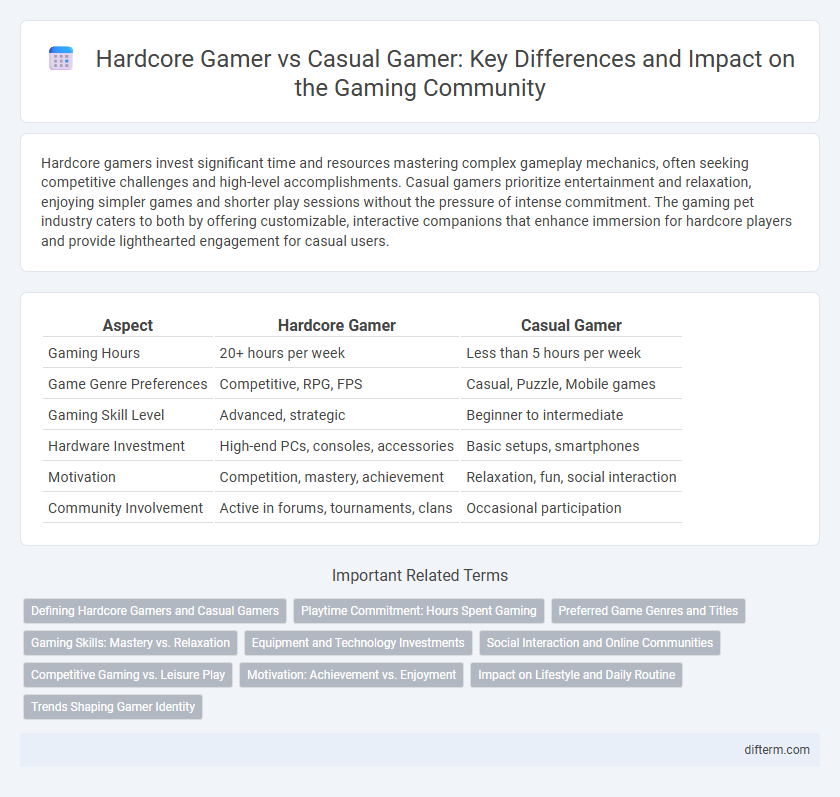Hardcore gamers invest significant time and resources mastering complex gameplay mechanics, often seeking competitive challenges and high-level accomplishments. Casual gamers prioritize entertainment and relaxation, enjoying simpler games and shorter play sessions without the pressure of intense commitment. The gaming pet industry caters to both by offering customizable, interactive companions that enhance immersion for hardcore players and provide lighthearted engagement for casual users.
Table of Comparison
| Aspect | Hardcore Gamer | Casual Gamer |
|---|---|---|
| Gaming Hours | 20+ hours per week | Less than 5 hours per week |
| Game Genre Preferences | Competitive, RPG, FPS | Casual, Puzzle, Mobile games |
| Gaming Skill Level | Advanced, strategic | Beginner to intermediate |
| Hardware Investment | High-end PCs, consoles, accessories | Basic setups, smartphones |
| Motivation | Competition, mastery, achievement | Relaxation, fun, social interaction |
| Community Involvement | Active in forums, tournaments, clans | Occasional participation |
Defining Hardcore Gamers and Casual Gamers
Hardcore gamers dedicate extensive time and resources to mastering complex game mechanics and competing at high skill levels, often engaging in challenging genres like MMORPGs, FPS, and strategy games. Casual gamers prefer shorter play sessions with accessible, easy-to-learn games that emphasize fun and relaxation over competition or achievement. Core differences lie in commitment, game choice, and competitive intensity, shaping distinct gaming lifestyles and preferences.
Playtime Commitment: Hours Spent Gaming
Hardcore gamers typically invest 20 to 40 hours per week in gaming, demonstrating a high level of dedication and consistent playtime. Casual gamers usually play less than 10 hours weekly, balancing gaming with other social and professional responsibilities. This stark contrast in playtime commitment highlights the intensity and focus characteristic of hardcore gaming habits compared to the more relaxed approach of casual players.
Preferred Game Genres and Titles
Hardcore gamers often gravitate towards complex, competitive genres such as first-person shooters, real-time strategy, and massively multiplayer online role-playing games (MMORPGs), with popular titles including Call of Duty, StarCraft, and World of Warcraft. Casual gamers prefer accessible, easy-to-learn games like puzzle, simulation, and mobile games, favoring titles such as Candy Crush, The Sims, and Animal Crossing. Genre preference and game complexity distinctly differentiate hardcore gamers' intensive engagement from casual gamers' more relaxed playstyles.
Gaming Skills: Mastery vs. Relaxation
Hardcore gamers exhibit advanced gaming skills, showcasing mastery through hours of dedicated practice and strategic gameplay, often excelling in complex mechanics and competitive environments. Casual gamers prioritize relaxation and enjoyment, engaging with games at a comfortable pace without the pressure to achieve high-level performance or in-depth knowledge. The distinction lies in the intensity of skill development and the underlying motivation, with hardcore gamers driven by skill mastery and casual gamers valuing leisurely entertainment.
Equipment and Technology Investments
Hardcore gamers invest heavily in high-performance gaming rigs, including gaming PCs with advanced GPUs, mechanical keyboards, and high-refresh-rate monitors to enhance precision and responsiveness. Casual gamers often opt for more affordable, plug-and-play consoles or entry-level laptops, prioritizing convenience over cutting-edge technology. The significant disparity in equipment and technology investments reflects the differing commitment levels and gameplay intensity between hardcore and casual gaming communities.
Social Interaction and Online Communities
Hardcore gamers often engage deeply in online communities, participating in competitive clans, forums, and live-streaming platforms to build strong social connections and share strategic insights. Casual gamers typically prefer more relaxed social interactions, such as occasional multiplayer sessions or social media groups centered around game-related content. The intensity and frequency of social engagement in gaming communities significantly differ between hardcore and casual gamers, influencing their overall gaming experience and sense of belonging.
Competitive Gaming vs. Leisure Play
Hardcore gamers prioritize competitive gaming, investing extensive hours in skill development, strategy mastery, and participating in ranked matches or eSports tournaments to achieve high rankings and recognition. Casual gamers engage in leisure play primarily for relaxation and entertainment, selecting games that offer low commitment, simple mechanics, and social interaction without pressure to perform. The distinction between competitive gaming and leisure play influences game design, community engagement, and player retention strategies within the gaming industry.
Motivation: Achievement vs. Enjoyment
Hardcore gamers are primarily driven by achievement, seeking mastery, high scores, and competitive success in games such as esports or challenging RPGs. Casual gamers focus on enjoyment and relaxation, favoring accessible, low-commitment games like mobile puzzles or social simulators. This motivational difference influences gameplay intensity, time investment, and preferred gaming platforms.
Impact on Lifestyle and Daily Routine
Hardcore gamers often dedicate multiple hours daily to intense gameplay, influencing their sleep patterns, social interactions, and physical activity. Casual gamers typically engage in shorter gaming sessions, allowing more balanced integration with work, family, and recreational activities. The differing time commitments directly affect mental focus, stress levels, and overall lifestyle habits between the two gaming profiles.
Trends Shaping Gamer Identity
Hardcore gamers exhibit a deep commitment to complex, skill-intensive games, often engaging in long sessions and competitive play, which shapes their identity around mastery and community status. Casual gamers prioritize accessibility and entertainment, favoring shorter, more intuitive gaming experiences that fit diverse lifestyles and social interactions. Emerging trends highlight the blending of these identities through cross-platform games and hybrid game modes, reflecting evolving player preferences and technological advancements.
hardcore gamer vs casual gamer Infographic

 difterm.com
difterm.com